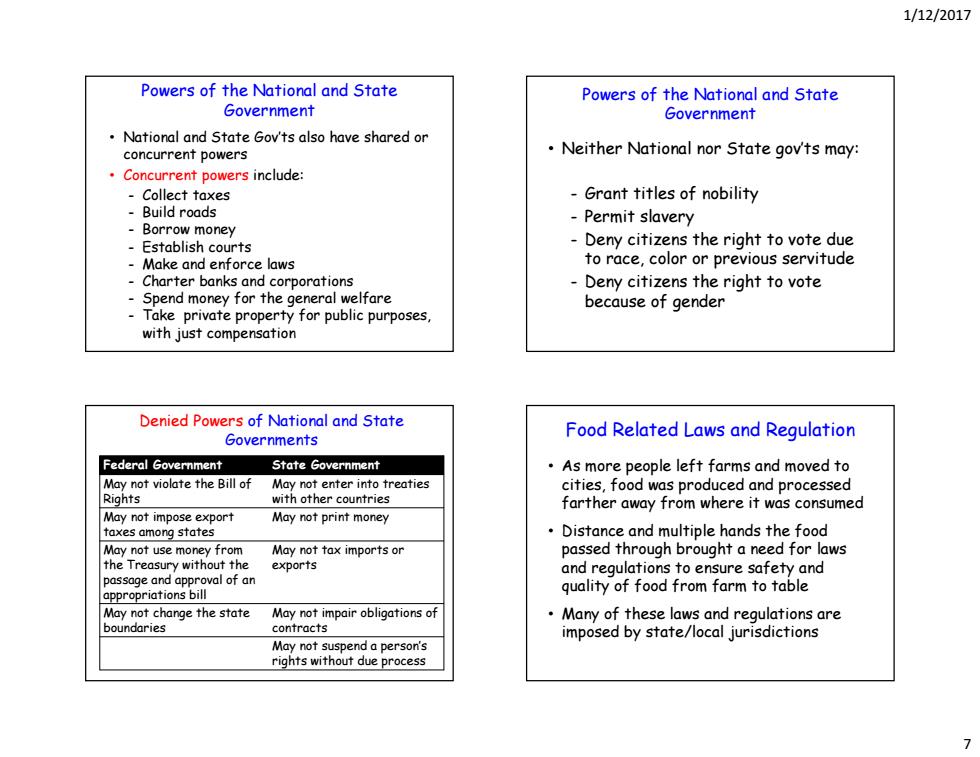
1/12/2017 State Government State Government Civil War Amendments In the 1930s,Great Depression brought the 15th Amendment-"The rights of citizens of end to dual federalism the US to vote shall not be denied or States could not cope with the economic abridged by the US or by any State on upheaval account of race,color,or previous condition President Roosevelt's New Deal brought in of servitude" cooperative federalism The New Deal National,state and local governments were The Three R's AMENDMENT FIFTEEN encouraged to work together on specific programs State Government Exclusive Powers of National and State Government Cooperative federalism Federal Government State Government gov't roles are not as clearly defined as Print Money Issue licenses with dual federalism Regulate interstate and Regulate intrastate business national and state gov'ts share policy international trade Make treaties and conduct Conduct elections responsibilities foreign policy both levels of gov't work together Declare war Establish local gov'ts simultaneously in the states.... Provide an army and navy Ratify amendments to the carrying out mandates passed Constitution by the federal gov't Establish post offices Take measures for public health and safety duplicating efforts of one Make laws needed to carry Exert powers not delegated another on a policy area out these powers to national gov't and is not prohibited by the States 6
1/12/2017 6 Civil War Amendments • 15th Amendment – “The rights of citizens of the US to vote shall not be denied or abridged by the US or by any State on account of race, color, or previous condition of servitude” State Government • In the 1930s, Great Depression brought the end to dual federalism • States could not cope with the economic upheaval • President Roosevelt’s New Deal brought in cooperative federalism • National, state and local governments were encouraged to work together on specific programs State Government • Cooperative federalism - gov’t roles are not as clearly defined as with dual federalism - national and state gov’ts share policy responsibilities - both levels of gov’t work together simultaneously in the states …. carrying out mandates passed by the federal gov’t duplicating efforts of one another on a policy area State Government Exclusive Powers of National and State Government Federal Government State Government Print Money Issue licenses Regulate interstate and international trade Regulate intrastate business Make treaties and conduct foreign policy Conduct elections Declare war Establish local gov’ts Provide an army and navy Ratify amendments to the Constitution Establish post offices Take measures for public health and safety Make laws needed to carry out these powers Exert powers not delegated to national gov’t and is not prohibited by the States

1/12/2017 Powers of the National and State Powers of the National and State Government Government National and State Gov'ts also have shared or concurrent powers Neither National nor State gov'ts may: Concurrent powers include: Collect taxes -Grant titles of nobility Build roads -Permit slavery Borrow money Establish courts Deny citizens the right to vote due Make and enforce laws to race,color or previous servitude Charter banks and corporations Deny citizens the right to vote Spend money for the general welfare -Take private property for public purposes, because of gender with just compensation Denied Powers of National and State Governments Food Related Laws and Regulation Federal Government State Government As more people left farms and moved to May not violate the Bill of May not enter into treaties cities,food was produced and processed Rights with other countries farther away from where it was consumed May not impose export May not print money taxes among states Distance and multiple hands the food May not use money from May not tax imports or passed through brought a need for laws the Treasury without the exports and regulations to ensure safety and passage and approval of an appropriations bill quality of food from farm to table May not change the state May not impair obligations of Many of these laws and regulations are boundaries contracts imposed by state/local jurisdictions May not suspend a person's rights without due process
1/12/2017 7 • National and State Gov’ts also have shared or concurrent powers • Concurrent powers include: - Collect taxes - Build roads - Borrow money - Establish courts - Make and enforce laws - Charter banks and corporations - Spend money for the general welfare - Take private property for public purposes, with just compensation Powers of the National and State Government • Neither National nor State gov’ts may: - Grant titles of nobility - Permit slavery - Deny citizens the right to vote due to race, color or previous servitude - Deny citizens the right to vote because of gender Powers of the National and State Government Denied Powers of National and State Governments Federal Government State Government May not violate the Bill of Rights May not enter into treaties with other countries May not impose export taxes among states May not print money May not use money from the Treasury without the passage and approval of an appropriations bill May not tax imports or exports May not change the state boundaries May not impair obligations of contracts May not suspend a person’s rights without due process • As more people left farms and moved to cities, food was produced and processed farther away from where it was consumed • Distance and multiple hands the food passed through brought a need for laws and regulations to ensure safety and quality of food from farm to table • Many of these laws and regulations are imposed by state/local jurisdictions Food Related Laws and Regulation